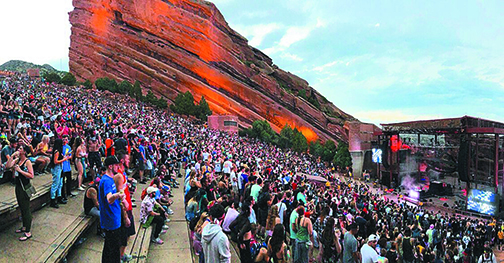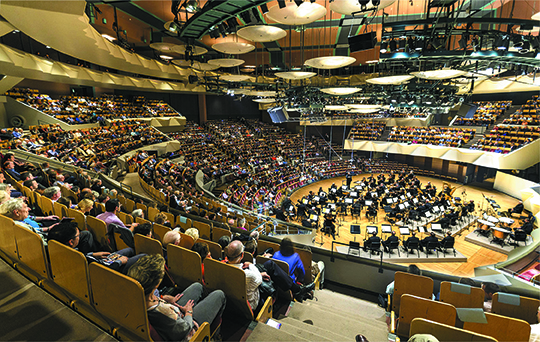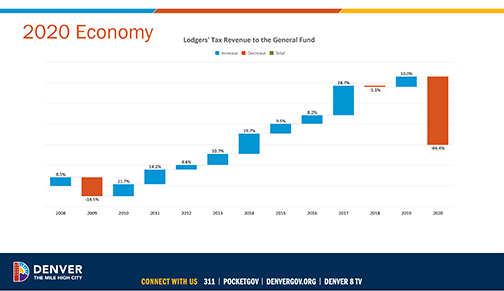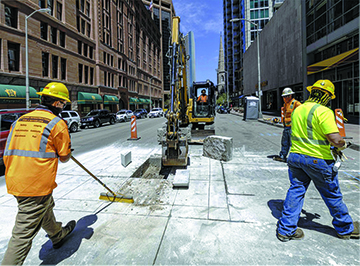Arts & Venues Shutters Renowned Facilities, Lays Off Staff; Drastic Cutbacks Loom For The Upkeep Of City Streets, Parks
by Glen Richardson
Even as businesses have reopened helping to jumpstart the Cherry Creek Valley economy, it has come too late for the City & County of Denver. An unprecedented crisis is brewing in city government as tax revenue has fallen off a cliff.

Sounding the alarm this month that Denver is facing a fiscal reckoning of apocalyptic proportions is Arts & Venues, the City & County of Denver agency responsible for operating the Cherry Creek Valley’s most renowned facilities.
Effective this month through Jan. 2, 2021, it is shutting down Red Rocks Park & Amphitheatre, the Colorado Convention Center, the McNichols Civic Center Bldg., the Denver Coliseum plus the Denver Performing Arts Complex (DCPA) which includes the Ellie Caulkins Opera House, the Buell Theatre and Boettcher Concert Hall. The announcement includes full-time or partial furloughs of all 67 employees. The Coliseum and Convention Center will remain operational only for coronavirus related programs.
Cultural Crash
When the pandemic hit, the agency cut its expenses by 46% and moved capital improvement funds into the operating budget. “However, these prudent measures are not enough to sustain the agency if the fallout from the pandemic continues through 2021,” Executive Director Ginger White Brunetti declared in making the decision.

In an August report, Arts & Venues said Denver’s creative industries lost $1.4 billion in sales revenue and 29,840 jobs between April 1 and July 31. Red Rocks, in particular, has turned from a reliable cash-generator to a gaping hole in not only Arts & Venue’s budget projections, but those of promoters such as AEG Presents Rocky Mountains, which books the majority of Red Rocks’ 150-plus annual concerts. Bottom line: It’s taken fewer than six months to wipe out one-third of the gains Denver’s cultural sector had made in the last decade.
“It’s hoped that by pausing things now, at a time we know our venues won’t be open, Arts & Venues can be in a financial position to reopen quickly once live entertainment returns,” explains Brian Kitts, Director of Marketing & Communications.
A $227 Million Deficit
There are no ifs, ands, or buts about it, Denver’s economic reckoning has arrived and city departments will have to take major steps to try and stay afloat through next year. The pandemic recession is eroding the city budget in many insidious ways: Lodgers tax revenue has plummeted 66.4%, sales tax revenue declined 12.3% while general fund revenue has slumped 10.6%.

Predicted to be down by $180 million in June, the city now faces at least a $227 million budget shortfall. The city has added eight mandatory unpaid furlough days for all city employees and requiring budget cuts across all city agencies, currently targeted at $185 million.
Beginning this month City Council will begin hosting hearings on budget proposals by city agencies. Council members can propose amendments to the budget. The mayor then must submit a final 2021 budget for adoption.
Topping Great Depression
The 2020 city budget included projections that the general fund would increase by 2% — the main budget area under the mayor’s control. That prognosis would have created the largest general fund in the city’s history. In reality it is already down 10.5%, driven by the sales tax and lodgers’ tax — both down significantly.
The lodgers’ tax has dropped by 66.4% so far this year and sales tax toward the General Fund has declined by 16.8%. Both of those figures are much steeper declines than the city saw during the Great Recession.
The crisis has arrived faster and the damage will be more severe than that of the 1930s Great Recession. The fact administrators and bureaucrats have become accustomed to a constant ramped-up expansion in the past few years will make it seem even worse. Nonetheless, impact from cuts will be felt far into the fiscal year ahead.

Streets, Parks Hit
The fiscal reckoning that shut down Arts & Venues, is set to hit Parks & Recreation and Transportation & Infrastructure departments the hardest as the 2021 budget is hammered out by city council. Mirroring the Great Recession, the budget of Parks & Rec. will take at least a 25.34% cut in 2021. With more than 6,200 acres of parkland, 29 recreation centers, 309 athletic fields plus other amenities it’s a horrendous hit. Moreover, the agency has already adopted $2 million in cost cutting measures.
Planting of flower beds has been cut by 50%. Likewise, litter pickup and trash removal in most parks has also been cut 50%. Mowing of parks and athletic fields has been slashed from weekly to two or three times per month as staff is available. Finally, use of the irrigation systems — raw water, reuse and potable water systems — is now based on water source cost, least to most.
Transportation & Infrastructure — the new department launched this year with a thousand projects in its capital budget — is projected to take a 23.75% 2021 budget cut. Both the agency’s maintenance and wastewater management group had $150 million budgets. Previously known as the Department of Public Works, the agency plans, designs and builds the city’s infrastructure, aka streets, bridges, overpasses and storm sewers. They also fill potholes, handle parking enforcement and plow streets after snowstorms.
Budget Showdown
The Hancock administration has significantly expanded the size of the city workforce since taking office in 2011. Dozens of new offices and initiatives have been added. Even with the latest shutdowns and layoffs, the mayor is proposing a $71.3 million new Housing Stability Department and also refuses to cut $11.4 million in new bike lane construction.

Normally city council makes only minimal changes in the mayor’s proposed budget. Councilwoman Candi CdeBaca forewarns, however, that she’s prepared to fight the administration’s budget.
Beyond this year, the pandemic economy will continue to weigh heavily on the city’s outlook. The likelihood remains for elevated unemployment levels well into 2022. Visit Denver expects lodgers’ tax collections to remain below 2019 levels into 2022. Property taxes payable in 2022 are likely to be calculated off lower commercial valuations — business closures, retail-office vacancies — and lower residential assessed values.
